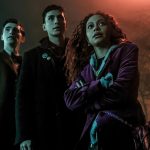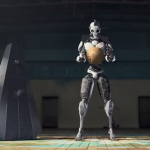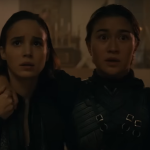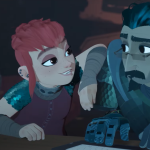PaleyFest 2025: ‘Cobra Kai’ Panel
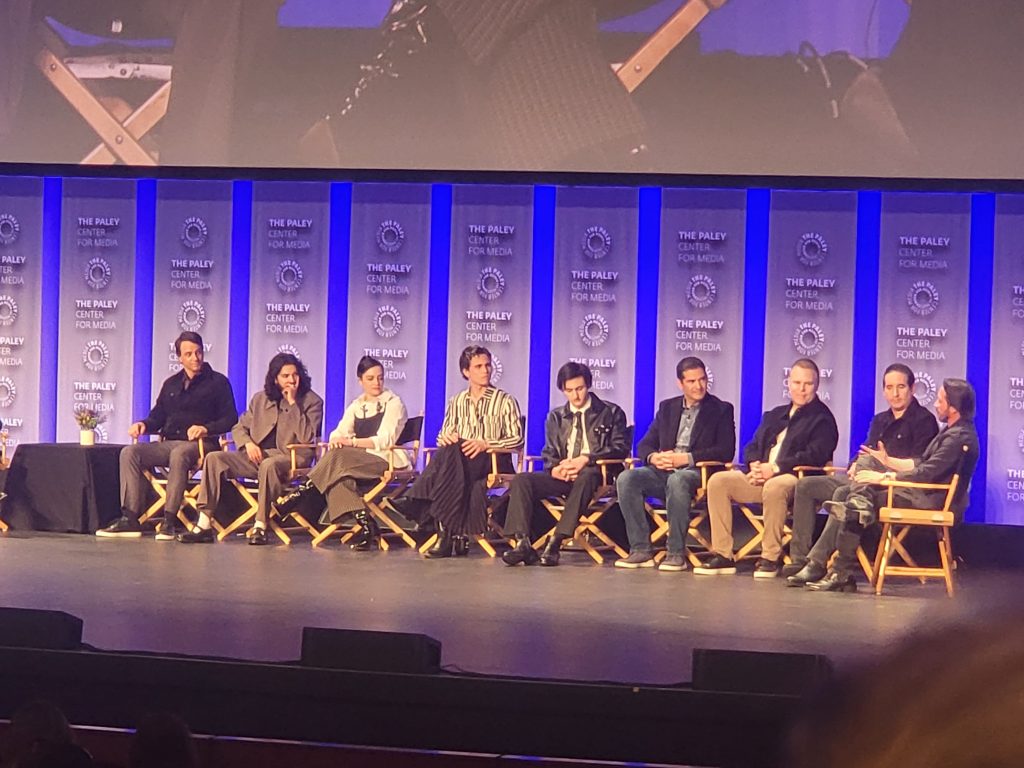
After six years, the dojo is finally closed. Cobra Kai, the series with a 94% approval rating on Rotten Tomatoes, has ended its run on its own terms. On March 22, 2025, the series was celebrated at this year’s PaleyFest and I was lucky enough to attend the event.
Following a screening of the last episode of the series, “Ex-Degenerate”, the panel included Ralph Macchio (Daniel LaRusso), Xolo Maridueña (Miguel Diaz), Tanner Buchanan (Robby Keene), Mary Mouser (Samantha LaRusso), Gianni DeCenzo (Demetri Alexopoulos), Josh Heald (executive producer, writer, and co-creator), Jon Hurwitz (executive producer, writer, and co-creator), Hayden Schlossberg (executive producer, writer, and co-creator), and Don Lee (fight coordinator), and was moderated by Perri Nemiroff. William Zabka, who played Johnny Lawrence, was unable to attend, but sent a video that was … very Johnny Lawrence that was shown prior to the episode (he kept re-starting the recording, having different ways to say ‘enjoy the show’, seemed to not know how to operate the camera, etc.).
The panel started off by talking about the Karate Kid franchise and the legacy of the movie both at the beginning of the show’s run and now at its end. “The Karate Kid was always for me—I was very protective of it,” Macchio said. “I had gone to a few folks pitching the idea that were kind of ‘one-off’ bad ideas. But I had the Harold & Kumar and Hot Tub Time Machine guys,” he said with a laugh. “What it meant to me is kind of never losing sight of the themes, the source, the ‘Miyagi-ism’, the ‘Miyagi-verse’, and that kind of soulful magic, that secret sauce of the original film.”
Nemiroff then asked the creators what they kept in mind to keep the respect of the original film, as well as lessons learned along the way. “Well, it started off with that intent,” Hurwitz began. “When we had our very first pitch meetings, we talked about this as a show that people from seven to seventy were going to love. It was something that we knew that people like us who grew up with The Karate Kid and were giant fans of Daniel and Johnny and Kreese and Ali and that whole group: we knew that we were going to hit the bullseye for them. But beyond that, it was important to us for a new generation to fall in love with these new karate kids in the same ways that we fell in love with The Karate Kid back when we were young.”
So when did they have that moment when they realized Cobra Kai was something that meant something to people? “When we moved over to Netflix, it was right around the time of COVID,” DeCenzo started. “So anytime anyone would go out, we would wear really thick masks. My hair was a mess: I hadn’t cut it in like four or five months. And people were recognizing me somehow. And it was just like, ‘Oh, my God: this really means something to people.’ I think that’s just a dream come true as an actor, to be part of something that so many people enjoy that you enjoy making.”
“I think the thing that I always get really excited to hear is the connections that it’s made between different people and their families,” Mouser added. “The people who come to me and say, ‘You know, this brought me and my dad together’, or, ‘This brought me and my sister closer.’ Trying not to get all emotional, but I think that has been the through-line even to now.”
Buchanan added on to this idea. “I recently had someone who was I think in their late 50s, early 60s, that was like, ‘I’ve not talked to my dad in probably 40 years. We started watching Cobra Kai and for some reason I felt like I needed to reach out to him, and we both happened to be watching it. I don’t know how much longer he’s going to be alive, but we have a relationship now because of the Robbie and the Johnny relationship or because of the Miguel and the Johnny relationship.’ It’s crazy how much heart and connection it makes between human beings.”
Lee added a different angle. “I joked with Ralph about this when I first met him,” he said. “I said, ‘You know, it’s because of you I joined martial arts.’ It’s surreal. One of the most special things about The Karate Kid was you saw Daniel LaRusso and you just said, ‘Martial arts is for everybody. It’s not [just] for the Johnny Lawrences of the world. Everyone can do martial arts. [It’s] so much more than just physical traits: it’s characteristics, it’s humanity.” He continued, “The funny thing is people may say on the stage, ‘You’ve taught a lot of martial arts to everyone that’s here’, but the thing is is that they’ve all taught me how to be a better human and understand life and just the whole creativity process of things.”
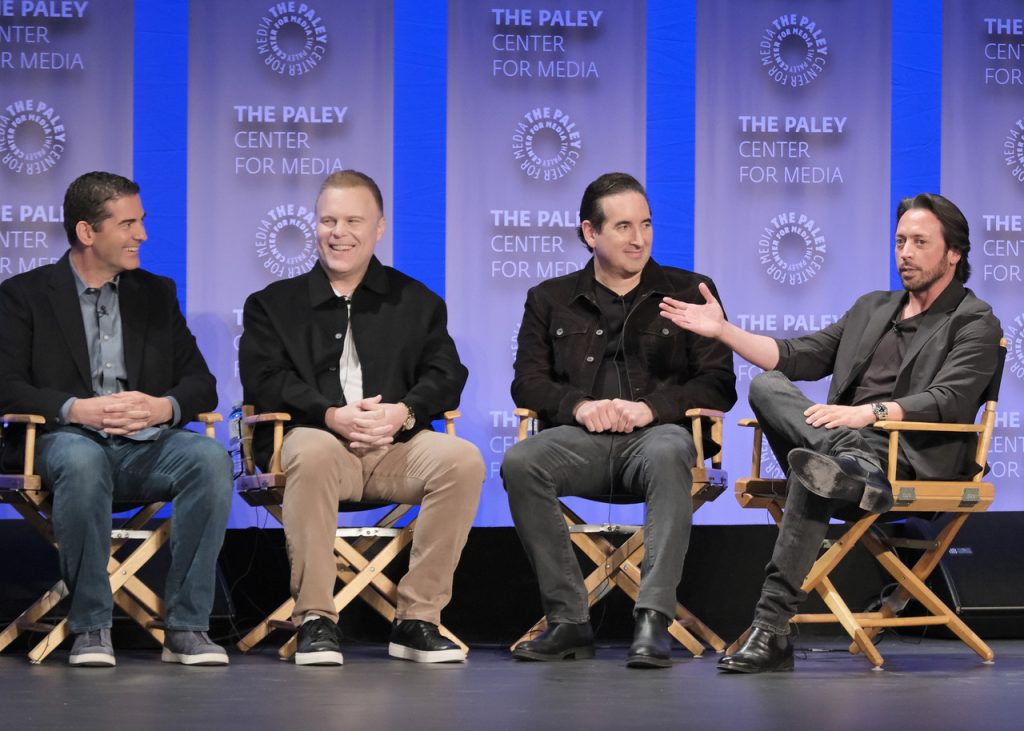
Of course, nowadays, a show getting six seasons is becoming quite rare. Add in the fact that the show was able to go out on their own terms and you truly have something special in entertainment. Nemiroff next asked the co-creators about how they initially envisioned the series and how it may have evolved as the show progressed.
“That first season we had, it was like a movie in our minds,” Schlossberg said. “We knew exactly how we were going to end with Kreese setting up a season 2. And we knew deep into the future, we wanted Johnny and Kreese to ultimately reconcile and that character would be redeemed, and Johnny and Daniel to come together and end the rivalry. We didn’t know exactly how things were going to unfold, but we really felt we had a lot more fun to play with after that first season.
“When the first season came out and was a success on YouTube, at that juncture, we really felt like, ‘Hey, you know what? This show works.’ When you have something that’s successful with a great cast, you don’t want that to end. You do want it to go on, but we’re our toughest critics and we know that the moment the story starts to repeat or you start to go to too ridiculous places, the whole thing ends. This was like a real serialized story that we were telling.
“I’d also say along the way, there were a couple of things—like ‘You’re the Best Around’ as a song or the fly with chopsticks that were just these nostalgia weapons that we had. We’re like—don’t use them yet. Let’s just find the right place for them. So every season, we attacked with, ‘Hey, let’s tell something fresh, but we also have some fun stuff to the past to bring in.’ We really felt by the end of it, it was just amazing for it all to come full circle.”
Nemiroff next asked Macchio what it was like jumping back into a role he’s played before but at a different stage in life. “Stepping into Daniel LaRusso 34 years later, it’s almost like playing a different character on one sense, because his life had happened. Wisdom supposedly was gained. It felt like it was a log time ago, but then there were moments I would actually play things—I’d recall sort of taking those steps as the teenage Daniel LaRusso. There were some conscious choices made to sort of mirror that, even though so much life had gone on.”
He went on to describe his entering Cobra Kai in the second episode, stating, “It just felt like we had something we didn’t even know we had, and that was really galvanized, ‘Wow: this is gonna go someplace. The Cobra Kai’s Daniel LaRusso, as I call him, that certainly early on was sometimes challenging for me. We’d always talk it through with the guys, because I knew I had to take one for the team at times to show Johnny Lawrence’s growth, because that was always been the trajectory of this series: it is Johnny’s redemption story.”
The discussion moved onto plots that the actors felt were off about their characters, and Buchanan talked about the scene in season 2 where Robby kicks Miguel off a banister during a fight. Buchanan talked about how he was afraid that it would ruin the work the show had done to make his character a likeable one.
“I’ll just say I think for us, we never viewed any of the characters as bad guys or good guys,” Hurwitz said in response. “I think what we were trying to tell was a human story for all of these characters, and these characters made mistakes at times. Even Daniel: even when you have great mentors in life and you’ve learned a lot and you know the right thing to do—I’m in my 40s right now, and I make mistakes in life. We all in life, people of all ages know better and still make mistakes in life, which is why we felt it was possible for any of the characters to make certain mistakes along the way.”
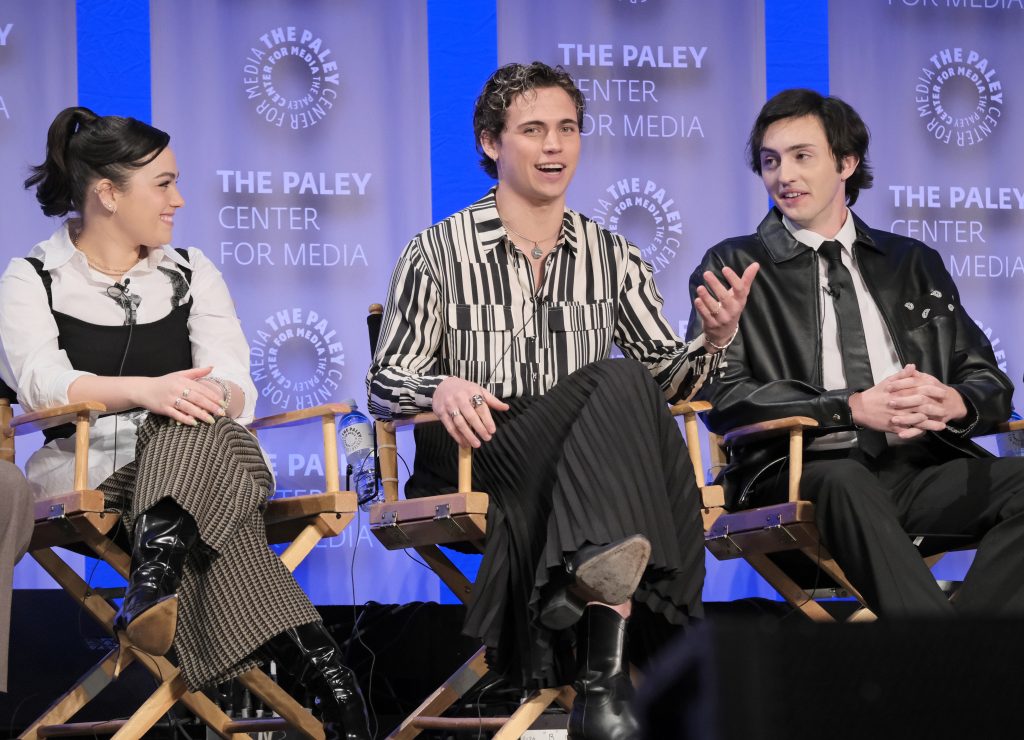
“It needs to be a dialogue,” Heald said. “The characters are as much theirs as ours in the writer room and even more so theirs, as they embody them and make choices. They do something; we take that into the writers’ room and say, ‘They’re doing something with that. Let’s evolve that. I didn’t see that relationship actually having that color to it until we saw it on its feet. It becomes this moving organism that kind of belongs to everybody.”
Nemiroff asked Lee about what it was like putting together a fight that is entertaining and exhilarating to watch but also reflects the entirety of Johnny’s journey and the franchise overall. “Being able to come back to help physically tell that story that these guys have written for Johnny’s comeback and for him to have that vindication,” Lee replied. “You wanted to keep it authentic: the action’s in the writing. There’s a shot in the [last episode] that to me was so pivotal as a martial arts person, as someone who does fights, watches fights. There was a movement where this whole season was about Johnny finding balance and not to charge.”
“That was the fun of the whole series,” Schlossberg added, “figuring out the style of fighting and why are these moves related to the character and where they’re going. It’s really a philosophy mixed in with the martial arts that kind of makes the story of the fight that much better.”
Nemiroff then moved to the character of Miguel, and asked Maridueña about one of the last scenes that interconnects with flashbacks. “Don and Ken definitely had the whole thing mapped out,” Maridueña said. I was learning it like a new fight. I wasn’t playing the flashback in my head while we were fighting. I was just as awestruck watching the final product and seeing, ‘Oh, my gosh: everything that Johnny’s saying in that moment—the highs, the lows, everything—it really stuck to me.”
He went on to add, “It was less about [Miguel] being the best fighter and him using these values, these life lessons that he’s learned over these past years and executing it to the best of his ability, and sometimes that’s enough.”
“That was truly one of the highlights,” Macchio continued, “just in the story structure and going back in the throughline of Miguel, who was always described by Hayden as the millennial Daniel LaRusso.
A question from the audience was to the co-creators, asking what they thought the secret was to making a show like this work. “Just the latest update of Chat GPT,” Schlossberg joked. Getting serious, though, he continued, “This can’t happen with a lot of properties. It just happened to be we’re enormous fans of this franchise, happened to be of filmmaker age, we happen to have stars from the original movies that look great: it’s all in the stars aligned.”
He continued, “It’s just you have to have a connection to these characters and want to tell a new story. We never wanted to do a remake. The Karate Kid exists: I don’t need to see another one. But if you could give me those feels, maybe a little music, maybe some special moves and stuff like that… There’s the kid in me that wants to see that. That was the secret: we wrote for our middle-aged selves and the kid in us, so it worked for everyone.”
Another question from the audience was about how much training the cast had before they auditioned for the roles. “I think it’s well known that I am the least athletic person I’ve known,” Mouser said with a laugh. “Funny enough: my character was the only one who was supposed to have had any karate training beforehand, so double the pressure in that sense. But I think that the magic of it was we were learning all these lessons along with our characters as we went. The really fun part of it, for me at least, is the takeaway of walking away from having now trained for seven years and these last few seasons buckling down and taking it into my personal life, letting myself fully commit to the world of martial arts and letting that part of me that has been so committed to the idea that I was the least athletic person that I knew and really just going for it and trusting that you know all of the right elements were there.”
She paused as she teared up. “The whole point of learning all these lessons and learning martial arts for me, the whole point was learning the life lessons of inner strength, a sense of self, a sense of direction. Learning respect, learning dedication to something, learning to not listen to the voice in your head that tells you, ‘Give up. It’s too hard.’ Figuring out that the whole point in applying those lessons is really not having to use the fighting portion. The fighting portion is beautiful and wonderful and a great way to get to know your body and your physical strength, but the lesson I took away from it was that’s the tool to help you learn the lesson.”
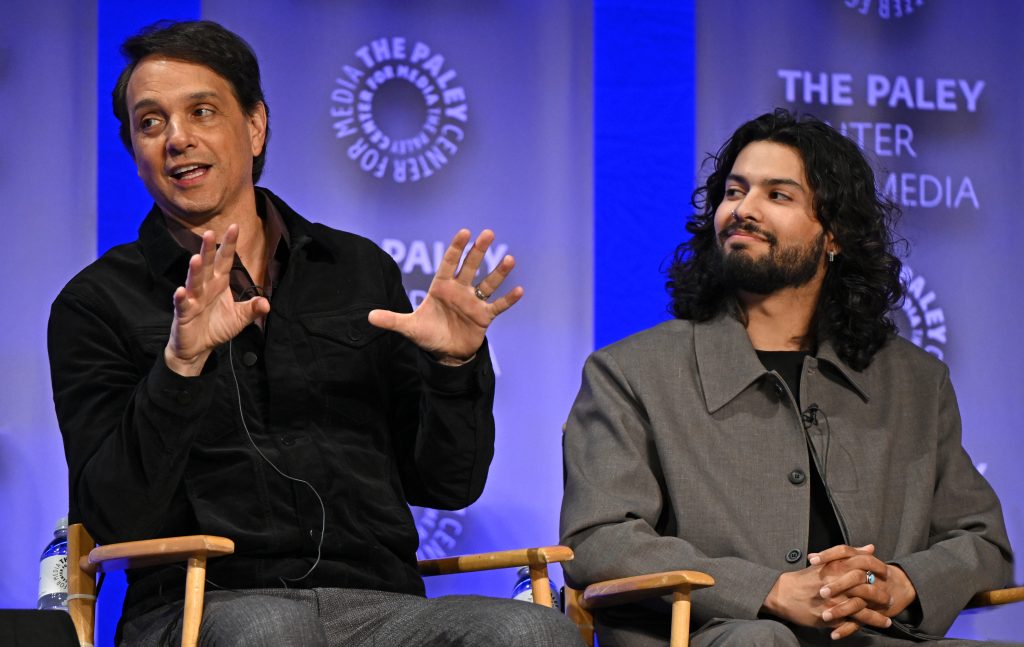
Nemiroff used that as an opportunity to ask Macchio about his journey with the franchise, and what Cobra Kai as a dojo means to him and what does Cobra Kai now means to him as it concludes. “It’s interesting,” Macchio started. “When I first sat down with John, Josh, and Hayden in New York on an ‘Okay, I’ll hear this out.’ I had no idea: I just knew they wanted to do something with The Karate Kid franchise. First, Hayden led off with the word ‘bullying’: I said, ‘Okay: that’s good. Thematically, we’re in.’ I don’t know which was the next one, he said, ‘So the name of the show is Cobra Kai.’ I almost got up and left,” he said with a smile. “‘And you’re going to play a car salesman,’ and I was like, ‘Whoa, whoa, whoa, whoa.’ They needed to course correct really quickly, and they obviously did.”
He continued, “The Karate Kid always for me was Miyagi. He’s the heart, the soul. The performance by Pat Morita was the secret sauce that made the movie more than just another ‘80s teen film. So, Cobra Kai was always like, ‘Oh, yeah: that’s the bad guys in the movie.’ I never thought of it from the perspective of how John, Josh, and Hayden thought of it. At that time, I had just seen the movie Creed. Timing is so important with these things. That film was the way to get into the Rocky universe without doing Rocky VII.
“Now, going through all the lessons learned and the writing taught and all the generational aspects: if they pitched to me at that table after mentioning the name of it that I was going to be a car salesman and say I kicked his face and all the other stuff, it probably may not have worked out as well. We started talking about these characters. I started seeing the longevity of the show more. Sometimes we need to take that path to come back around to understand the balance. I’m Miyagi-do for life. I’ve learned to accept the fruits of dabbing my toe in the Cobra Kai world.”
Cobra Kai can still be seen on Netflix, and the Paley Center has released the video of the full panel on their YouTube channel. You can see all the photos I took for this panel and the Agatha All Along panel that followed on my Flickr account.
Author: Angie Fiedler Sutton
Angie Fiedler Sutton is a writer, podcaster, and all-round fangirl geek. She has been published in Den of Geek, Stage Directions, LA Weekly, The Mary Sue, and others.
She also produces her own podcast, Contents May Vary, where she interviews geeky people about geeky things. You can see all her work (and social media channels) at angiefsutton.com.
Help support independent journalism. Subscribe to our Patreon.
Copyright © The Geekiary
Do not copy our content in whole to other websites. If you are reading this anywhere besides TheGeekiary.com, it has been stolen.Read our

